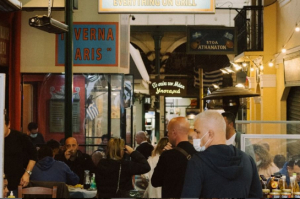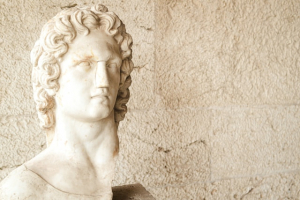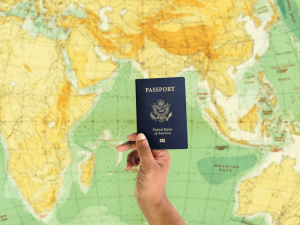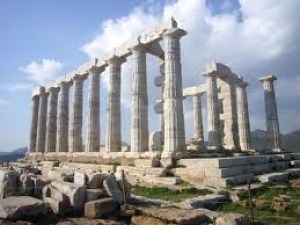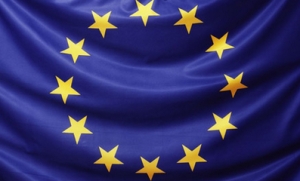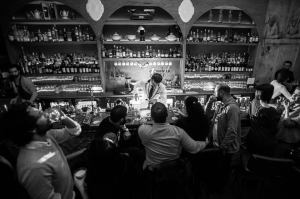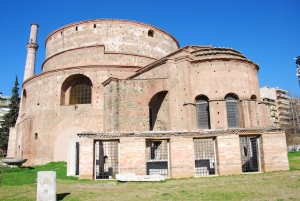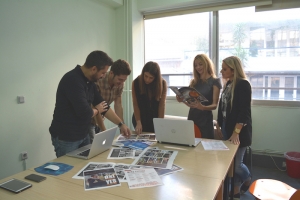In "Alexander: the Making of a God" (now on Netflix), we get to see some discoveries from Dr. Calliope Limneos-Papapakosta's excavation at Alexandria. Would Alexander's tomb be the greatest archaeological discovery?
Yes – and No. Yes, because it’s been sought for so long, speculated over so hard, and there’s a powerful mystique surrounding royal tombs (think – the Pyramids, the tomb of the first Chinese emperor, or … the Tombs of the Macedonian royals at Aigai, on which more below …). No, because I – like most sober, non-partisan observers and analysts – believe it’s been lost forever beneath the sea-waves that have long ago submerged the entire Royal Quarter of ancient Alexandria in Egypt.
Can we get our heads around the notion that Alexander had two fathers -- dual descent?
Olympias certainly did want everyone to believe that her firstborn son’s conception had something of the divine about it – though whether she fingered Zeus or an Egyptian-Greek variant of him, Ammon, is unclear. In another sense, regardless of what tale (myth) of his conception Olympias had put about, everyone would have accepted that Alexander as son of Philip II was at least descended from, even if not actually sired by, Zeus. This was because all Macedonian royals were considered to be lineally descended from Heracles, and Heracles was – in myth – sired by the greatest Olympian divinity of them all, Zeus.
Did Alexander believe that Artemis was present at his birth? Artemis was indeed for all Greeks a goddess of childbirth – but she had no special Macedonian, let alone royal-Macedonian connections. Alexander’s Epirote mother much preferred Dionysus - and his house speciality of fermented grape-juice and associated ecstatic orgiastic rituals - to Artemis the perpetual virgin of the wild margins.
Murder at a Wedding Why did Alexander have a falling out with his father, Philip? Alexander too found the volatile, controlling Philip at best difficult, at worst impossible. So great had been his own estrangement, not too long before 336, that he had even gone into more or less involuntary temporary exile abroad. The issues between them were essentially personal, questions of power rather than of foreign policy objectives on which they were basically agreed.
And do you think it likely that Alexander and Olympias had a hand in Philip's murder? I do think it very likely that Olympias had a hand in arranging Philip’s assassination – for, had Philip not been assassinated in 336, Philip and not Alexander would have led the planned Persian expedition that made Alexander’s name. Alexander would have been left behind at the Macedonian capital, Pella, to serve as Regent, a role he had performed (and exploited for personal advantage) already when only a teenager. By 336, Olympias had long ago fallen out with and been estranged from her husband. Over her son, however, she continued to exercise a powerful both attraction and domination. (He ‘joked’ that she charged him a high rent for the nine months she’d housed him in her womb.)
Tombs Did Olympias' tomb or the tombs of Alexander's Persian wives ever get discovered? Alexander’s mother Olympias was buried in Pydna, northern Greece – no question: written and documentary sources are agreed. But does the
Tomb of Korinos house her tomb, as has been alleged? The jury is still out on that.
Alexander’s wives: he had three, simultaneously, all of them Iranian. The graves of none of them have been located.
What is Philip II's tomb like? Only for Philip II (assassinated at Aigai in 336 BCE) has a seriously good case been made that his actual tomb has been located. Unfortunately, dispute continues over which of the earliest two of the three tombs excavated underneath the massive Aigai tumulus was his: was it Tomb I or II? Since II is more magnificent than I, in terms of its offerings, many have wanted it to be his, but there are legitimate doubts of a both chronological and osteological nature, suggesting that it is in fact that of Philip III Arrhidaeus, Alexander’s mentally impaired half-brother: Philip III of Macedon.
That would leave
Tomb I for Philip II. One of its most famous features is an interior fresco depicting the abduction of Persephone (daughter of goddess Demeter) by Hades, eponymous ruler of the subterranean kingdom of the shades. (Tomb III is agreed to be that of Alexander IV, the ill-fated posthumous son of Alexander with his first wife, Rhoxane of (central Asian) Bactria or Sogdia.)
Alexander’s Death & Body SnatchingWhat caused Alexander’s Death? How – or of what – Alexander died is one of history’s great mysteries. At one level, the question is binary: was it natural causes – or murder? If the former, what disease was it exactly that did for him at the tender age of nearly 33? If the latter, who – most – wanted him dead?
My historian’s instinct suggests that it was the unexpectedness, suddenness and prematurity of Alexander’s death, added to the king’s own known fears of assassination (but by force not poison), that gave rise to conspiracy theories of suspicious death – presumably by poisoning. More likely, in my view, is that he succumbed to some disease, his bodily resistance already fatally weakened due to a combination of near-death illnesses, grave war-wounds – and excessive alcohol consumption.
How and why did Alexander’s body get snatched? As for how his – mummified – body ended up being buried in Egypt, first in Memphis, then at last in the new Egyptian capital he had founded, Alexandria, the story’s a bit complicated. Here are the headlines. Mummified in June 323 in Babylon, the corpse was somehow preserved there in southern Iraq until 321 when it was included in a grand cortege designed to transport it back to mainland Greece, for glorious reburial in the royal graveyard at Aigai (today’s Vergina). But near Damascus the caravan was intercepted, and the corpse hijacked, on the orders of Ptolemy son of Lagos, a Macedonian with whom Alexander had grown up and been educated, and whom Alexander had promoted to the highest status possible among his intimate Companions, that of one of his seven special Bodyguards.
Pharaohs: Alexander, Ptolemy, Cleopatra Like the other Successors, Ptolemy had huge ambitions? Under the immediate post-mortem carve-up of Alexander’s empire, Ptolemy became viceroy (satrap) of the vital province of Egypt. But he harboured grander ambitions: to emulate Alexander as Egyptian Pharaoh, even though he hadn’t a drop of royal blood in his veins. The capture of Alexander’s corpse as a talisman in 321 – and grandiose reburial in a specially built Mausoleum at Alexandria (the clue’s in the name) - were an earnest of his future intentions, realised in 305 BCE. Whence the ‘Ptolemaic’ ‘royal’ dynasty, culminating in the reign and suicide in 30 BCE of Cleopatra VII.
Richard Marranca is an author who teaches ancient world, myth, and religion at Montclair State University. He writes for various print and digital publications, and his upcoming book, "Speaking of the Dead: Mummies & Mysteries of Egypt," will be published by Blydyn Square Books. Richard has had the honor of receiving a Fulbright to teach at LMU Munich and spent a semester in Athens during his doctoral studies at New York University. In his career, Richard has had the privilege of interviewing esteemed classicist Paul Cartledge on topics ranging from Alexander the Great to Greek philosophy.

